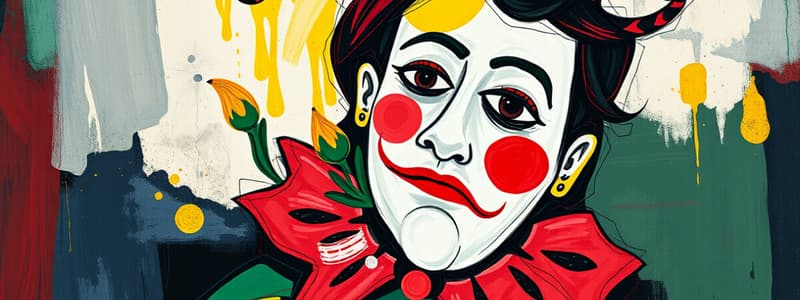Podcast
Questions and Answers
What is Puck's first line in Act 2 Scene 1?
What is Puck's first line in Act 2 Scene 1?
How now, spirit! Whither wander you?
What does Oberon express in Act 2 Scene 1 about Titania?
What does Oberon express in Act 2 Scene 1 about Titania?
The king doth keep his revels here to-night: Take heed the queen come not within his sight;
What consequence does Oberon state will happen to the next creature that sees the Athenian in Act 2 Scene 1?
What consequence does Oberon state will happen to the next creature that sees the Athenian in Act 2 Scene 1?
Will make or man or woman madly dote upon the next live creature that it sees.
What does Oberon wish to achieve by obtaining the Indian boy from Titania?
What does Oberon wish to achieve by obtaining the Indian boy from Titania?
What does Puck claim to be in Act 3 Scene 2?
What does Puck claim to be in Act 3 Scene 2?
What does Oberon instruct Puck to do regarding the Athenian's eyes?
What does Oberon instruct Puck to do regarding the Athenian's eyes?
What does Oberon mean by saying 'What hast thou done?' in Act 3 Scene 2?
What does Oberon mean by saying 'What hast thou done?' in Act 3 Scene 2?
What does Titania request in Act 4 Scene 1?
What does Titania request in Act 4 Scene 1?
What does Oberon plan to do after releasing Titania from her enchantment?
What does Oberon plan to do after releasing Titania from her enchantment?
What does Puck say will happen now that he has successfully caused confusion among the lovers?
What does Puck say will happen now that he has successfully caused confusion among the lovers?
Flashcards are hidden until you start studying
Study Notes
Overview of "A Midsummer Night's Dream" Puck Lines
- Puck, also known as Robin Goodfellow, is a key character known for his mischievous nature and serves Oberon, the Fairy King.
- The selected lines highlight Puck's interactions with other characters, his role in the plot, and his whimsical personality.
Act 2 Scene 1 Highlights
- Puck initiates the action with a playful greeting to a wandering spirit, setting the tone for mischief.
- A fairy expresses concern over Oberon's jealousy regarding Titania's affection for a changeling boy, reflecting tension between the fairy king and queen.
- Puck describes his antics, showcasing his ability to transform and confuse mortals, contributing to the comedic element of the play.
Oberon’s Plans
- Oberon reveals his intent to use a magical flower to cause love mischief, indicating the play's central theme of love and enchantment.
- He tasks Puck with retrieving the flower, demonstrating their playful yet manipulative dynamic as fairy personalities develop through action.
Puck's Mischief
- Puck mistakenly applies love potion to the wrong Athenian male, leading to a mix-up in romantic affections, emphasizing the theme of mistaken identities.
- His playful nature causes chaos as he leads the mechanicals on a wild chase, revealing the disconnect between the fairy and human worlds.
Titania's Enchantment
- Titania unwittingly falls in love with Bottom, who has been transformed to have a donkey's head, a vivid illustration of love's irrationality in the play.
- The enchantment drives the plot twist, showcasing the absurdity in love and the consequences of magical interference.
Resolution and Themes
- The resolution involves Oberon returning the changeling to Titania, restoring harmony in the fairy realm, and signifying the resolution of conflict.
- Puck's closing lines encapsulate the playful spirit of the narrative, inviting the audience to perceive the events as a whimsical dream.
Design Elements in the Play
- The use of magic serves as a device to explore themes of love, identity, and transformation.
- Contrasting fairy and mortal worlds highlight the play's comedic elements, with Puck serving as a bridge between them.
- The comedic mishaps driven by Puck's actions reinforce the central theme of love's folly, critiquing the nature of romantic relationships.
Conclusion of the Play
- The conclusion offers a reflective tone on the nature of illusions and reality, emphasizing the role of dreams in human experience.
- The final invitation to applaud underscores the interactive nature of the play, directly addressing the audience and leaving them with a sense of closure and enchantment.
Studying That Suits You
Use AI to generate personalized quizzes and flashcards to suit your learning preferences.


